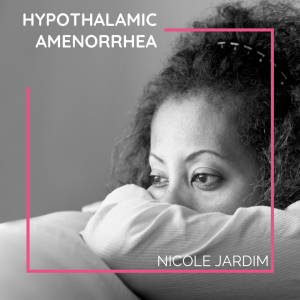This is a guest post written by Kate Callaghan, a holistic nutritionist and personal trainer who was diagnosed with Hypothalamic Amenorrhea two years ago. If you’re currently not getting your period, please read this post and let us know in the comments about your experience.
I have always had a very athletic physique. Friends, family and clients have always complimented me on my 6-pack abs, often telling me how lucky I am to have the body I do. It has nothing to do with luck. I have worked hard to maintain the way I look, but it is only recently that I have realized the cost to my overall health and wellbeing that has come with looking this way.
Two years ago, I stopped getting a regular period. In fact, I stopped getting a period altogether. After multiple tests, various health practitioners, and multiple misdiagnoses (PCOS being the most common of these), I finally got to the root of the problem. I had hypothalamic amenorrhea (HA).
Hypothalamic amenorrhea, in simple terms, basically means your hypothalamus (a major control centre in your brain) stops communicating to your lady garden, female hormone production slows and menstruation ceases. Some of you may be thinking this sounds fantastic not to have a period each month. Trust me – it’s not. Especially when you get to the age when you are considering baby-making.
So what causes HA? The research has suggested a few factors:
- Under-eating
- Over-exercising
- Too much stress
- Oral contraceptives
In my case, I was consuming around 1500-2000 calories per day, which doesn’t seem too low, but given that I was doing at least 7 hours of intense training per week, it was definitely too low for me. My body fat was 13% (it should be at least 22%). On top of that, add the stress of university, full time work and planning a wedding and voila – the reproductive system is no longer seen as a priority for the body to survive and so, essentially goes into shut-down mode. Sex hormone levels plummet (including testosterone, which is a key distinguishing factor from PCOS), fertility goes out the window and, perhaps the scariest factor of all – bones start to break down. How bad do you want those abs now?
So, if you think you too may have HA, you need to get on top of it ASAP to minimize any long term complications.
Here’s how to get started:
- Tell someone about it. I can’t express how important this is. If you have HA, chances are you aren’t too comfortable with putting on weight, especially fat. You will need as much support as you can get.
- Eat more. Aim for around 2000 calories per day, more if you are exercising. Be sure to include plenty of nourishing fats, such as coconut oil, butter and eggs for hormone production.
- Exercise smarter. Walk more, run less. Lift heavy weights once a week. Do yoga instead of cardio.
- Manage your stress. Meditation, deep breathing, sleeping well and simply having time-out can be incredibly healing.
While you may gain a little weight (which is probably much needed), some bonuses include increased energy and strength, clearer skin, whiter eyes and eventually, restored reproductive function.
These things take time, and can be difficult mentally and emotionally. Be kind to yourself. And remember this:
“A pretty face gets old. A nice body will change. But a good woman will always be a good woman” – Nate Diesel
 Bio: Kate is a holistic nutritionist and personal trainer with over 12 years of experience in the health and fitness industry. Kate is passionate about helping individuals achieve optimal wellness through nutrient-dense traditional whole-foods, adopting mindful and sustainable life practices, and moving in ways which rejuvenate rather than deteriorate the body.
Bio: Kate is a holistic nutritionist and personal trainer with over 12 years of experience in the health and fitness industry. Kate is passionate about helping individuals achieve optimal wellness through nutrient-dense traditional whole-foods, adopting mindful and sustainable life practices, and moving in ways which rejuvenate rather than deteriorate the body.
Website: www.theholisticnutritionist.com
Blog: www.againstthegrainnutrition.blogspot.com.au



